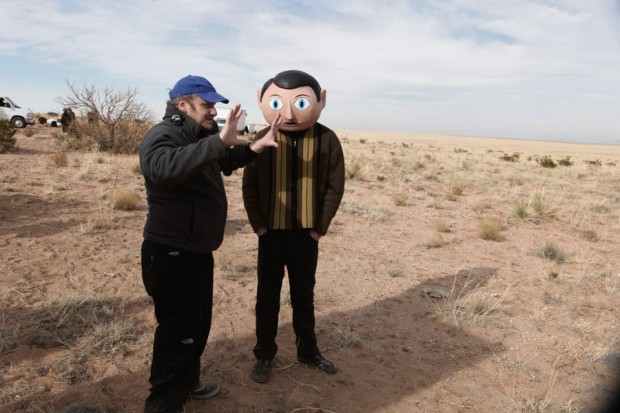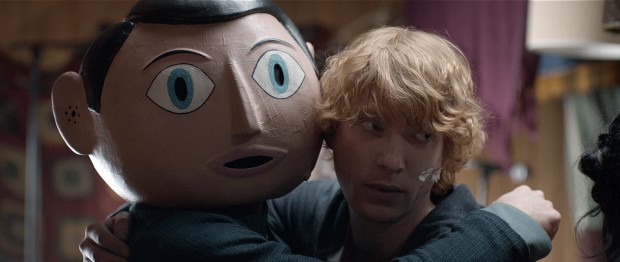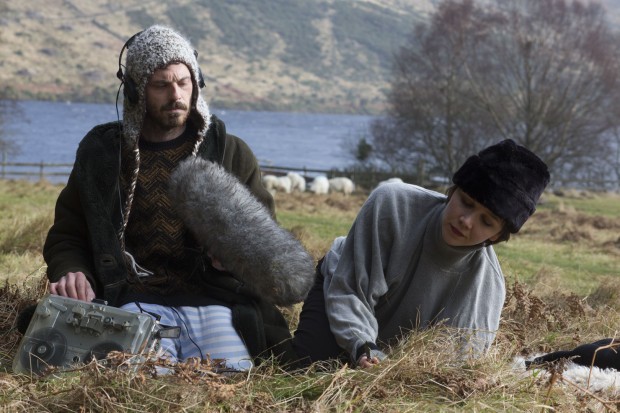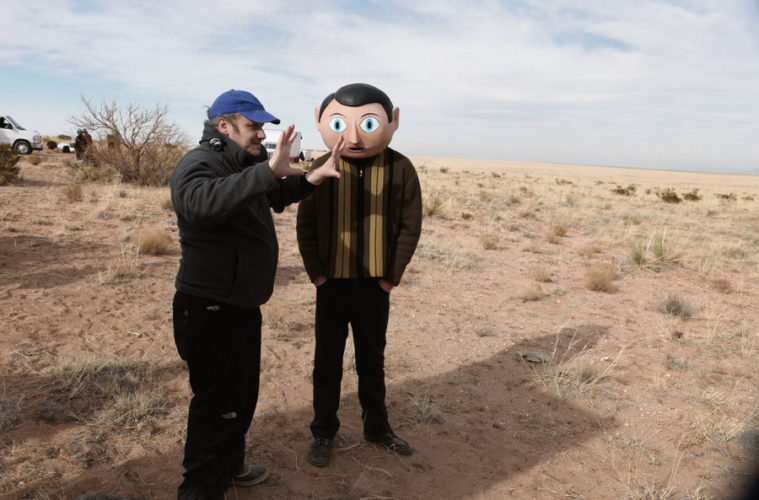
One of the more interesting films touring the festival circuit this year was director Lenny Abrahamson‘s Frank, which enters limited release this weekend. The film follows an eager musician named Jon (Domhnall Gleeson) who is suddenly thrust into a touring band’s role of keyboardist. Leading that band is Michael Fassbender‘s Frank, who wears an overlarge papier-mâché head both on and off the stage and acts exceedingly strange. It’s a film that follows their peculiar process of recording an electronic album that rarely appeals to anyone but the most out-there of minds.
So when I sat down at a roundtable to interview Abrahamson, I must confess I wasn’t sure what to expect from the man himself. But we got a very aware and intelligent conversation about why he cast such an incredible actor like Michael Fassbender, if he was going to cover him up the entire time, the way he designed the fake SXSW and actually fooled me into thinking it was filmed there, how the cinematic language didn’t really change just because of the large papier-mâché head, why he thinks the film has garnered such a strong reaction, and much more. Read on below for the entire conversation and watch a conversation with the actors.
The Film Stage: The sound mix at the beginning of the films is very interesting, the way he’s walking down the street and he’s got all these different voices going on. You didn’t play with that all that much throughout. Is that mainly to put us in the headspace of the main character?
Lenny Abrahamson: Yeah, exactly. The first three minutes or probably less that leads up to the opening title is really just a very self-contained pre-title sequence designed to say, “Here is the main character of the film.” It’s quite self conscious in that respect. It takes you from a guy who you have no idea about standing on a beach to the point he realizes he just copied another song. I know what he wants. I know what he can’t do. You understand, without much dialogue, who the guy is. In my other films which have been more naturalistic — certainly my last film — I would never do anything like that. In those films I was keen not to determine characters so quickly; in other words, what I was trying to do was to force the audience to try and explore characters themselves. But this is a very different kind of film and you’re playing with those tropes of guys who desperately are in a band. You’re looking at those ideas in a broader way so it made sense to really define the character and play with that through the film.

Can you talk about where your main character comes from and the character of Frank comes from?
It’s funny looking at the online discussion in the UK about this. People are aware of some of the antecedents to this film and there’s a bit of a debate about it. I’ll tell you the history of them and what the debate shows. Jon Ronson, who is a writer you might know (he’s on the The Daily Show sometimes), he wrote the book The Men Who Stare at Goats and The Psychopath Test. In the 80’s he was in a band in Manchester with this character. The character was Frank Sidebottom, who was a character created by a punk comedian creative, a very hard to define creative force called Chris Sievey. His schtick was he wore this big fake head, but he sang in this high-pitch accent. He sang silly songs. You saw him on kids television and he became a cult figure. Years later, when Jon and Peter were working together on the Men Who Stare at Goats just started riffing on this idea of the figure with the head. That became a magnet, that central image, it seemed to draw in other ideas taken from other outsider musicians. Frank Sidebottom wasn’t an outsider musician, he was a comedic creation. But Chris himself had that outsider spirit and Frank was a curiosity but there was also something very moving about him.
That became the beginning of this journey which took elements of Beefheart, Daniel Johnston, Harry Partch, Roky Erickson, all these people we were pretty fascinated with. The film is a riff on that, a riff on lots of traits of those characters and it talks about other things as well. What’s interesting about the debate back in the U.K. is that die-hard Frank Sidebottom fans, some, and Frank’s family are very supportive of the film. Chris Sievey himself didn’t want a biopic made, but he was really behind this idea before he died. But some of the very die-hard fans feel we’ve trampled on the purity of the original inspiration. I think people are very rigid in the categories they like to use to think about films. It’s either a biopic or it’s not. And if it is, why is he American? And if it’s not, why he’s wearing a head like Frank Sidebottom? I think the answer is that it’s own thing. It’s a creative leap. It’s a leap taken in the spirit of that original inspiration, and we didn’t want to deny that inspiration, hence the name, but it is a lot about other things as well. In America this is irrelevant, but is quite a debate among the fans.
It’s interesting thinking about the way this film would be received by an American audience and taking it back to the U.K., especially when looking at the cast. You have three core actors, all from such different backgrounds, and being received at different levels in different markets. What was it like exploring the creative dynamic between the actors?
That’s always the unknown going into any film — how the cast will gel and what that will bring up. As a director it’s a big mistake not to be sensitive to what’s really happening between the people who are in front of you; what they bring to their character and how they interact with each other. If you can make that work within the overall, the overarching thematic and tonal world of the film, then it’s always going to be better than just brining a rigid set of pre-conceptions as the director and just beating everybody into that mold. In this case, people got on really well. Particularly the early stages, we did some music rehearsal before we shot, before we did usual rehearsal. The band is really playing in the film. That meant we had to have a functioning band. That put constraints on what was written but also in a strange way liberated us in that we were really working with materials we weren’t just inventing.
People got on incredibly well both musically and personally, particularly François [Civil] who plays the bass player and Carla [Azar] who is the drummer were inseparable through the film. The rhythm section was this unit on and off the camera and they see each other all the time. I think Michael is very friendly with the other members of the band. He would have known Domhnall before, but with the other members they’re all in touch with each other. They’re all quite keen to play together again as a band. You can’t really know that in advance. I have certainly been in situations were people don’t get on that well. It’s quite interesting the relationship between Maggie [Gyllenhaal] and Michael it was really sparky and creatively exciting and I think for Maggie it was really interesting having this strong emotional connection to a character she can’t see. That plays really well.
It’d be one of those things where you’d have to employ so many different cards of your imagination. You’re projecting onto something you can’t see physically.
In a strange way, it isn’t difficult. I’d almost rather say it’s a bit like watching the film, and I suppose every viewer is different, but you kind of forget about the head. We forgot about it on set. I remember thinking, “Will I adjust? How will it be?” I had strong sense of how I was going to make the scenes, but still you ask yourself, “When I’m there, will the normal filmic grammar make sense in relation to Frank?” Like going in for a close-up, you go in on somebody to get a sense of what’s going on but actually you also go in for a close-up because it’s the way film sentence structure works. It’s telling you something significant is happening even if nothing is changing on the face. That dimension of the filmmaking process applies seamlessly to Frank. At the same time, Michael’s small movements — his tiny little settlings and readjustments — if you have a puppet you can make that puppet so expressive. It is remarkable how much you can take away and have a fully three-dimensional character. What it also gives you is this element of playful withholding.
Part of what became really interesting when we were working on the script was people’s conventional understanding of creativity. The Jon character is throwing the kitchen sink at what it is that makes Frank good. Jon is not prepared to admit he just doesn’t have any talent. He thinks there’s some secret — if he had been in a mental hospital, or had an abusive childhood, or any of the number of things he wishes. He’s just this middle-class kid, but if only I had this great awful life, I too could be this creative genius. Domhnall’s part, I think, is the hardest thing in the film, purely from a technical point of view — being the center, quite often unappealing, being the one who the straight person in all this madness is really hard. You really feel his face changing from the beginning of the film to the end. He seems more at home with himself. There’s a melancholy resignation at the end, and he tracks that so subtly and so well through the film.
Was Michael on set the whole time and was wearing the head the whole time? It could have been just a voice performance and nobody would have known.
Yeah. We made the decision early on and he was a 100% determined on this that it would always be him. Apart from a half a second during one stunt, it’s always him. It’s him during the album play. He claims he doesn’t work out, but I don’t buy that at all. If it hadn’t been him you might not know, but it wouldn’t be as good a film. One interesting thing that came out in the cutting of the film; we had thought it was handy we can’t see the lips, so if you really need to take the lines from a take that’s working really well… But there’s just something about it, you want to be able to mix takes, take the voice from one take and use the pictures from another. Why not do that with Frank? It almost never worked. The body language just kind of worked. As human beings, if we’re good at anything, we’re good at reading other people. What makes you think somebody is trustworthy or not? You couldn’t write it down. It’s tiny things they do. I find this really fascinating to think about: people that have one or more senses that don’t work still compensate superbly with the other senses. We are getting much more information than we know by watching a person perform. Michael’s voice, which are all sorts of things in there, Iggy Pop and a bit of Jim Morrison when he’s singing, he really enjoyed that challenge and it was fun to do.
How did you land Michael Fassbender?
We sent the script to his agency. You do it in the sense of who might be interesting for some of the parts in this film. His agent is smart and Michael is too, so there was kind of a hope but not an expectation that he’d be interested. When he found out he was it was really great. I think there are all sorts of reasons why it’s really great. Why cast him if you’re not going to show his face? I hope when people see the film they get the why and get an amazing performance. Also, we’re not saying whether you see his face or not. You have to see the film. The other thing about it, the challenge for him was great. He loved the script, he laughed a lot at it. It’s a testament to the fact that Michael is not some kind of — none of the people in the film are — calculating career builders. They are people who are drawn to pleasures, difficulties, challenges of acting. It’s great. He can do X-Men and he can do 12 Years a Slave or any of the other number of film he chooses.
What it did bring is a physicality to the part. I don’t think we would have gone this route, but with Michael, there’d be a danger in thinking about a character like Frank to go with a Michael Jackson, childlike, wonder-filled amazement, and that would be what you expect. With Michael you get this extra dimension; the tyrant as well, the intensity, you get all that stuff too. This wasn’t something we thought about consciously at the beginning, but the film is a lot about the way people project versions of themselves. Jon is, through social media, desperately projecting a version of himself that is much more exciting and ironic than the real one. We trade in those things, especially in this industry, as well-known actors become a brand version of themselves. The film, among other things, it says there is value in just the thing in itself regardless of how many followers or how many hits it gets on YouTube. That’s not the mark of greatness. If that’s the case not showing your big, huge star is a big statement by the film. If you don’t like it, fine. This a performance we’re not trying to sell, we’re trying to be true to it — true to the idea.

You filmed at SXSW, so I assume you got permission from them to do so. How much does that directly lead to you getting into SXSW?
It’s a good question. We actually filmed in Albuquerque but we made it SXSW. We were filming in New Mexico. Thanks for thinking it. I take that as a compliment. We studied a lot and recreated little chunks of it. The convention center bit works really well. I’ve never been to SXSW until now and when I walked into the convention center I thought we did a pretty good job. I don’t think anything in our imaginations could quite prepare me for the sheer hipster kind of intensity of the place, but we did our best. I don’t know. We didn’t premiere here. We premiered at Sundance and there are all sorts of reasons one might do that. It’s more of a market and frankly what you’re doing when you premiere your film is that you’re trying to sell it. I think honestly had SXSW not liked the film they wouldn’t have shown it. But I think they wanted to like it because it’s crazy; it’s too good a story not to tell here. The audience certainly seemed to go with the SXSW part last night.
There’s been such a huge reaction to the film. What do you think it is about the craziness and the vibe of this film that has struck such a chord with so many different movie viewers?
It’s very hard to see your own film objectively. But what I think is unusual about the film is how difficult it is to think of any other film that is like it. It doesn’t fit into any obvious genre. It is funny, including moments of pure slapstick, but it’s also quite poignant and thoughtful and playful. There are ideas at play. There are pleasures to be had both in the comedy and the music. The obligation I always feel when making a film, especially one like this, is to make it as rich as possible, where families of ideas and themes and ways of executing it that somehow resonate, where the form and the function fit together. If you do that, I think an audience will recognize that. I know when I go and see a film whether I feel if the people who made it have sweat over it. Or is it just some simple dashed off thing or an attempt to catch a wave or target a particular audience?
I do think everybody, all the people who made the film — actors, us, writers, people who are releasing it — they all really believe in it. Everybody put their heart and soul into it. Loads of creative hours went into the film. It’s like the old-fashioned websites where there’s just one layer versus one with loads of deep rich content where you can come at them from different angles. In terms of how the film will be released, we have all this other music, we have filmed songs stuff that isn’t in the film — demos the band did in the studio before we shot. I have a whole archive of influences that went into. Same way the pictures were evolved, the way the head was designed. I feel like if you do that work in preparing a film what you end up with is a very solid thing that you can look at from different angles.
Some people just get the comedy, some people are very moved by it, and some people a combination of both. It also resonates, even though it’s a film about a musician and musicians. All of us have, in some aspects of our life, huge desires which we know we can never fulfill. The things we would have loved to have been. Given that we live in a culture that says you can be anything you want, which is painfully untrue, people are very conflicted about those choices they make. People are encouraged not to be realistic about themselves. I think that’s very negative. The film interrogates a person, a person desperate to be something they’re not really cut out to be, and it lets them try, and in a pretty humane way it tracks what it feels like and what that person learns. I think that’s pretty relevant to us.
Frank hits theaters on Friday, August 15th.

